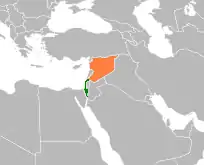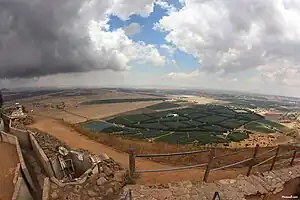Israel–Syria relations
Israel–Syria relations refer to the bilateral ties between the State of Israel and the Syrian Arab Republic. The two countries have been locked in a perpetual war since the establishment of Israel in 1948, with their most significant and direct armed engagements being in the First Arab–Israeli War in 1948–1949, the Third Arab–Israeli War in 1967, and the Fourth Arab–Israeli War in 1973. Additionally, Israeli and Syrian forces also saw relatively extensive combat against each other during the Lebanese Civil War, the 1982 Lebanon War, as well as the War of Attrition. Both states have at times signed and held armistice agreements, although all efforts to achieve complete peace have been without success. Syria has never recognized Israel as a legitimate state and does not accept Israeli passports as legally valid for entry into Syrian territory; Israel likewise regards Syria as a hostile state and generally prohibits its citizens from travelling there, with some exceptions and special accommodations being made by both countries for Druze people residing in Syria and the Golan Heights (regarded by the United Nations as Syrian territory, occupied by Israel since 1967).[1][2] Israel and Syria have never established formal diplomatic relations since the inception of both countries in the mid-20th century.
 | |
Israel |
Syria |
|---|---|
In line with the lack of diplomatic relations and continuous state of war, there have been virtually no economic or cultural ties between Israel and Syria, and a limited movement of people across the border. Syria continues to be an active participant in the Arab League's boycott of Israel. Both countries do allow a limited trade of items such as locally-grown apples for the Golan Druze villages, which are located on both sides of the UNDOF ceasefire line, and Syria provides 10 percent of the water supply for the Druze town of Majdal Shams in the Israeli-occupied Golan Heights as a part of an agreement that has been ongoing since the 1980s.[3] The state of peace at the Israel–Syria ceasefire line (which has served as the international border since the 1967 war) has been strained due to the Syrian Civil War, which began in 2011 and is ongoing as of 2023.
History
1948–1975

Syria has been an active belligerent, with periodic ceasefires and use of proxies, against Israel ever since May 1948, when the Syrian army captured territory from the newly established State of Israel north and south of the Sea of Galilee. Most of this territory was returned to Israel after the signing of the July 1949 Armistice Agreement and declared Demilitarized Zones. However, the exact location of the border between the two states, ownership of portions of territory and the right of Israeli farmers to farm the land in the Demilitarized Zones on the Israeli side of the border remained in dispute and sparked intermittent fighting between Syria and Israel until the 1967 Arab–Israeli War.
Since the 1949 Armistice Agreements, relations between Israel and Syria have been characterized by periods of hostility; ceasefire talks, sometimes through intermediaries; and disengagement agreements, such as the 1974 Israeli–Syrian disengagement agreement.
Through the early 1950s the Syrians gradually retook de facto control of some of the territory ostensibly belonging to Israel (along the foot of part of the western escarpment of the Golan Heights north of the Sea of Galilee, along the north-eastern coast of the Sea of Galilee and the low ground below the southern escarpment of the Golan). In addition to the territorial dispute, small-scale fighting was also sparked by a dispute over Israel's right to pump water from the Jordan River and the Sea of Galilee (actually a fresh-water lake) for use in agricultural irrigation and drinking.
From 1964 to 1966 the Syrians attempted to dig a canal that would divert the sources of the Jordan River before they entered Israeli territory—thus drying up that portion of the River and dramatically reducing the water-intake of the Sea of Galilee to prevent Israel from using that water. This led to a period of escalated fighting as the Israelis sought to prevent this diversion project which threatened to severely damage their ability to provide fresh-water to their population and agriculture (attempts to negotiate a solution by UN mediators failed). In fact, escalation of incidents between Israel and Syria in late 1966 and spring 1967 was one of the prime causes leading to the crisis that precipitated the Six Day War.
Prior to the 1967 Six-Day War, intermittent hostilities centered on the demilitarized zones, water issues and shelling and infiltration from the Golan Heights. Since the war, the focus of negotiations has been "land for peace," in particular a demand that Israel return the Golan Heights to Syria along with Syrian recognition of Israel and establishment of peaceful relations with it, as stipulated in UN Security Council Resolution 242, which became the basis for the peace process negotiations begun in Madrid, calls for a just and lasting Middle East peace to include withdrawal of Israeli armed forces from territories (note: not all territories) occupied in 1967; termination of the state of belligerency; and acknowledgment of the sovereignty, territorial integrity, and political independence of all regional states and of their right to live in peace within secure and recognized boundaries.
As a result of the mediation efforts of then US Secretary of State Henry Kissinger, Syria and Israel concluded a disengagement agreement in May 1974, enabling Syria to recover territory lost in the October war and part of the Golan Heights occupied by Israel since 1967, including Quneitra. The two sides have effectively implemented the agreement, which is monitored by UN forces.
And yet, in the US-brokered Syrian–Israeli talks during the 1990s, Syria demanded that Israeli future withdrawal would be to the "June 4, 1967 Lines", namely west of the former British Mandate border with Syria.[4] Syria attempted to recover the Golan Heights in the Yom Kippur War, but was unsuccessful, only recovering a small part of it in the 1974 disengagement agreement, while committing to distance its armed forces further eastwards compared with their 1967–1973 positions.
During Lebanese civil war
In December 1981, the Israeli Knesset voted to extend Israeli law to the part of the Golan Heights over which Israel retained control. The UN Security Council subsequently passed a resolution calling on Israel to rescind this measure. In 1982, Israel invaded Lebanon to drive out the PLO. Syria sent ground and air forces to assist the Lebanese, but these were largely routed by the Israelis. Syria continued to support Lebanese militias, leading up to Israel's withdrawal in 2000.
1990s peace efforts
The first high-level public talks aimed at a permanent resolution of the conflict between Israel and Syria were held at and after the multilateral Madrid Conference of 1991. Throughout the 1990s several Israeli governments negotiated with Syria's President Hafez Al-Assad. While serious progress was made, they were unsuccessful. Negotiations were conducted intermittently through the 1990s, and came very close to succeeding. However, the parties were unable to come to an agreement due to President Bill Clinton's failure to consult with the Syrian President, Hafez al-Assad during the negotiating process, Israeli Prime Minister Ehud Barak's backtracking on the issue of the northeastern shore of the Sea of Galilee and Syria's nonnegotiable demand that Israel withdraw to the positions it held on 4 June 1967 (which meant Israel would relinquish its claim to territory occupied by the Syrians in the early 1950s in contravention to the 1949 Armistice Agreement—including the north-eastern shore of the Sea of Galilee).
A major stumbling-block was that in response to Israel's demand that the entire Golan from the Jordan River to the outskirts of Damascus be demilitarized the Syrians demanded that Israel demilitarize all its territory to a similar distance from the new border. This was not acceptable to Israel as it would have effectively left all of northern Israel between the Jordan River and the Mediterranean Sea (more than a quarter of Israel), including the entire length of Israel's border with Lebanon, completely defenceless.
The peace negotiations collapsed following the outbreak of the second Palestinian (Intifada) uprising in September 2000, though Syria continues to call for a comprehensive settlement based on UN Security Council Resolutions 242 and 338, and the land-for-peace formula adopted at the 1991 Madrid conference.
During Damascus spring: 2000–2005
Tensions between Israel and Syria increased as the Intifada dragged on, primarily as a result of Syria's refusal to stop giving sanctuary to Palestinian militant groups conducting operations against Israel. In October 2003, following a suicide bombing carried out by a member of Palestinian Islamic Jihad in Haifa that killed 20 Israeli citizens, Israel Defense Forces attacked a suspected Palestinian militant training camp 15 kilometers north of Damascus. This was the first such Israeli attack deep inside Syrian territory since the 1973 war. Syria announced it would respond diplomatically, and asked the UN Security Council to condemn the Israeli action.
High points of hostility in the 2000s included the Ain es Saheb airstrike (an Israeli Air Force mission against Palestinian militants inside Syria) in 2003 and Operation Orchard (an Israeli air and commando mission against Syria's alleged nuclear program) in 2007.
Syrian alliance with Iran: 2006–present
During the 2006 Lebanon War, Syria threatened to enter the war on Hezbollah's side, provided support to Hezbollah, and allowed Iran to ship supplies to Hezbollah through its territory. Later, Turkey organized peace talks between the two countries, but Syria later withdrew in response to the 2008–2009 Gaza War.
The September 2007 Operation Outside the Box attack by the Israeli Air Force destroyed a facility that Israel claimed was a nuclear site in the Deir ez-Zor region.[5][6][7]
In 2010, Syrian President Bashar al-Assad accused Israel of avoiding peace, and Syrian Foreign Minister Walid Muallem warned that in the event of a future war, Israeli cities would be targeted by Syrian missiles. Israeli Foreign Minister Avigdor Lieberman responded by saying that the Syrian military would be defeated in a war with Israel, and Assad and his family would be forced from power. Lieberman also advised Syria to let go of the demand for the Golan Heights.[8] For several months in 2010 Prime Minister Benjamin Netanyahu of Israel engaged in secret, American-brokered discussions with Syria.[9]
During Syrian civil war: 2011–present
Several incidents have taken place on the Israeli–Syrian ceasefire line during the Syrian Civil War, straining the state of peace between the countries. The incidents are considered a spillover of the Quneitra Governorate clashes since 2012 and later incidents between the Syrian Army and the rebels, ongoing on the Syrian-controlled side of the Golan and the Golan Neutral Zone and the Hezbollah involvement in the Syrian Civil War. Through the incidents, which began in late 2012, as of mid-2014, one Israeli civilian was killed and at least 4 soldiers wounded; on the Syrian-controlled side, it is estimated that at least ten soldiers were killed, as well as two unidentified militants, who attempted to penetrate into Israeli-occupied side of the Golan Heights.[10]
On 11 May 2018, Israel urged Syria to reduce the level of Iranian military presence in the country, with Defense Minister Avigdor Lieberman stating: "Throw the Iranians, Qassem Soleimani and the Quds forces out of your country! They are not acting in your interest, they are only hurting you. Their whole presence only brings problems and destruction."[11]
On 10 July 2018, Lieberman did not rule out establishing "some kind of relationship" with Syria under Assad.[12]
On 11 July 2018, Netanyahu stated that Israel was not seeking to take action against Assad, but urged Russia to facilitate the withdrawal of Iranian troops from Syria.[13]
On 2 August 2018, Lieberman stated his belief that Syrian troops regaining control of the country's border with Israel would reduce the chance of conflict in the Golan Heights by providing "a real address, someone responsible, and central rule".[14]
In April 2019, Syria permitted the return of the remains of Zechariah Baumel to Israel in a Russian-brokered deal. In exchange, Israel released two Syrian prisoners as a "goodwill gesture" to Syria in January 2020.[15]
In January 2021, Syria denied reports of a Russia-mediated meeting at the Khmeimim Air Base between former IDF Chief of Staff Gadi Eisenkot and Syrian National Security Bureau head Ali Mamlouk.[16]
In February 2021, Israel took part in a Russian-brokered prisoner exchange with Syria, where Syria released an Israeli woman who had entered Syria in exchange for two Syrian shepherds who had entered Israel.[17] According to the Times of Israel, there was more to this agreement than purely a prisoner exchange, but that these details had been redacted by an Israeli military censor on media coverage of the agreement.[18] Subsequent foreign media reports revealed that Israel had supplied COVID-19 vaccines to Syria as part of the agreement.[19][20]
On May 19, 2022, the Israeli military said it activated its missile defences after wrongly identifying a danger near the Lebanon border.[21]
On May 20, 2022, an Israeli "aggression" launched from the Golan Heights and targeting southern sections of Damascus killed three individuals and inflicted minor material damage, according to the Syrian Ministry of Defense.[22]
Israeli humanitarian aid to Syrians
Operation Good Neighbor (2016-2018)
In June 2016, the Israeli military began Operation Good Neighbor, a multi-faceted humanitarian relief operation to prevent starvation of Syrians who live along the border and provide basic or advanced medical treatment.[23]
The aid consisted of medical care, water, electricity, education or food and was given to Syrians near the ceasefire line between Israel and Syria, often escorted across by Israeli soldiers. Over 200,000 Syrians received such aid, and more than 4,000 of them were treated in Israeli hospitals from 2013 to September 2018.[24][25][26] Many of the treated victims were civilians, often children.[27] Allegations have been made that some were rebel fighters from the Free Syrian Army. This theory is supported by the claim that Israel had a strategic interest in aiding the rebels; they fought against both ISIL and Iranian-allied forces.[28]
Israeli humanitarian assistance in aftermath of Syrian earthquake (2023-)
Shortly after of the 2023 Turkey and Syria earthquake, the State of Israel received a request Government of Turkey for assistance from the Israel Defense Force in search and rescue and recovery efforts, and the IDF deployed a large team of approximately 500 search and rescue professionals to assist the Turks in the aftermath of the earthquake. Prime Minister Benjamin Netanyahu has said he also received a request from Syria through Russian interlocutors to send aid to Syria and assist in search and rescue operations there even though the two nations are technically in a state of war and do not have relations. Israel has plans to send aid to Syria, including humanitarian aid, medication, blankets, and tents. In contrast to the assistance provided by Israel to Turkey, any assistance provided to Syria by the Israeli government would not involve the military, according to IDF spokesman Ran Kochav who stated that the military was not involved in potential aid to Syria.[29][30][31][32][33][34][35][36]
Economic relations
.jpg.webp)
There have been virtually no economic relations between the two countries since the creation of the state of Israel, and a limited movement of people across the border. Syria continues to be an active participant in the Arab boycott of Israel.
As an exception, since 2004 Syria has accepted apples from the Israeli-occupied Golan Heights through the Quneitra crossing. In 2010, Syria accepted some 10,000 tons of apples grown by Druze farmers in the Golan Heights.[37] Israeli minister Ayoub Kara called for an agreement with Syria over the supply of water to towns in the Golan Heights. Today, 10% of water in the Druze town of Majdal Shams is supplied by Syria, from the Ein al-Toufah spring. This arrangement has been in place for 25 years.[3]
Tourism and cultural exchange
In 2010, the Israeli government authorized a pilgrimage to Syria by a group of 300 Druze citizens of Israel interested in visiting religious sites there.[38] A group of dancers from five Druze villages in Israel was sent to Aleppo to perform in a dabka competition.[39] Civilians are permitted to cross the border at Quneitra for university studies and marriage. Syrian citizens of the Golan are entitled to free tuition, books and lodging.[40] Since 1993, 67 Syrian brides have crossed into the Golan Heights and 11 brides from Golan have crossed into Syria.[41]
See also
References
- "Druze in the Golan Heights have long been 'on the fence' between Syria and Israel. Syria's civil war has changed things". The World from PRX. Retrieved 16 July 2021.
- "For the Druze in the Golan Heights, the Syrian civil war opened a new door to Israel". Haaretz. Retrieved 16 July 2021.
- "Israeli Druze Minister: Syria Should Give Water to Golan Towns". Haaretz. 14 February 2010. Retrieved 17 April 2016.
- Frederic C. Hof, "Mapping Peace between Syria and Israel", United States Institute of Peace, Washington D.C. 2009
- "IAEA: Syria tried to build nuclear reactor". Ynet. Associated Press. 28 April 2011. Retrieved 6 March 2021.
- Beaumont, Peter (16 September 2007). "Was Israeli raid a dry run for attack on Iran?". The Observer/The Guardian. London. Archived from the original on 13 January 2008. Retrieved 16 September 2007.
- Stephens, Bret (18 September 2007). "Osirak II". The Wall Street Journal. Archived from the original on 7 February 2014. Retrieved 19 September 2007.
- "FM: If Syria provokes Israel, Assad will be out of power". The Jerusalem Post - JPost.com. Retrieved 17 April 2016.
- "Secret Israel-Syria Peace Talks Involved Golan Heights Exit". The New York Times. 13 October 2012. Retrieved 17 April 2016.
- "Israel kills two Syrian gunmen on Golan border". The Times of Israel. Retrieved 30 October 2014.
- Ahronheim, Anna (11 May 2018). "Liberman to Assad: Boot the Iranians out, for your own good". The Jerusalem Post. Retrieved 6 March 2021.
- "Israel 'not ruling out' eventual ties with Syria's Assad". Reuters. 10 July 2018.
- "Israel to Russia: Assad's safe from us, but Iran must quit Syria". Reuters. 11 July 2018.
- "Israel talks up Assad after insurgents killed on Syria frontier". New York Post. 2 August 2018.
- "Israel frees two as 'goodwill' for return of soldier's remains from Syria". Reuters. 28 July 2019.
- "Syria denies reports about meeting Israeli officials at Russian air base". Middle East Monitor. 19 January 2021.
- "Israel and Syria Complete a Prisoner Swap, Mediated by Russia". New York Times. 18 February 2021.
- "Israel agreed to more than just a prisoner exchange to get woman back from Syria". Times of Israel. 19 February 2021.
- "Israel said to have used Covid vaccines as bargaining tool in Syria prisoner swap". The Guardian. 20 February 2021.
- "Israel paying millions to supply COVID-19 doses to Syria". Al-Jazeera. 20 February 2021.
- "Israel fires missile defenses near Lebanon after misidentification". Reuters. Reuters. Reuters. 19 May 2022. Retrieved 22 May 2022.
- "Three killed in Israeli 'aggression' targeting southern Damascus, Syrian ministry says". Reuters. Reuters. Reuters. 20 May 2022. Retrieved 22 May 2022.
- Operation Good Neighbor: Israel reveals its massive humanitarian aid to Syria The Times of Israel, 19 July 2017.
- "Operation Good Neighbor: Bringing injured and sick Syrians into Israel - Arab-Israeli Conflict - Jerusalem Post". www.jpost.com. Retrieved 22 January 2019.
- Eglash, Ruth (19 July 2017). "For the first time, Israel describes the aid work it carries out in Syria" – via www.washingtonpost.com.
- Israel treating thousands of Syrians injured in war The Independent, 8 April 2017.
- "IDF details scope of Israeli aid to Syrians afflicted by war".
- Israel ‘giving secret aid to Syrian rebels’, report says: Direct funding, food, fuel and medical supplies allegedly provided by Israeli state to keep Isis and Iranian-allied forces in neighbouring civil war at bay The Independent, 19 June 2017.
- Schanen, Taylor, Naomi, Adam. "Countries rush aid, medical teams and rescue dogs to Turkey and Syria". Washington Post. The Washington Post. Retrieved 8 February 2023.
{{cite news}}: CS1 maint: multiple names: authors list (link) - Gross, Judah Ari. "Another Israeli aid delegation takes off for southern Turkey after deadly quakes". Times of Israel. The Times of Israel. Retrieved 8 February 2023.
- "The IDF's Humanitarian Aid Through the Years". IDF Humanitarian Missions.
- Odenheimer, Alisa. "Israel to Provide Rapid Aid to Turkey After Deadly Earthquake". Bloomberg News. Bloomberg. Retrieved 8 February 2023.
- Berman, Lazar. "Request was received': Israel to send earthquake relief to Syria as well as Turkey". Times of Israel. The Times of Israel. Retrieved 8 February 2023.
- Fabian, Emanuel. "We'll do our best to save lives': IDF rescue delegation arrives in southern Turkey". Times of Israel. The Times of Israel. Retrieved 8 February 2023.
- Fabian, Emanuel. "IDF to set up field hospital in Turkey; Israel's search and rescue team starts work". Times of Israel. Times of Israel. Retrieved 8 February 2023.
- Spiro, Amy. "Israel to dispatch emergency aid, teams to earthquake-stricken Turkey". ToI. The Times of Israel. Retrieved 8 February 2023.
- "Israeli Trucks Cross Into Syria in Annual 'Apple Invasion'". Haaretz.com. Archived from the original on 6 April 2010. Retrieved 17 April 2016.
- Einav, Hagai (6 October 2010). "Israeli Druze to go on historic visit to Syria". ynet. Retrieved 17 April 2016.
- "Hebrew press sees thaw in Syria-Israel relations". Maan News Agency. Archived from the original on 24 October 2014. Retrieved 17 April 2016.
- Susan Taylor Martin (18 February 2007). "Golan families dream of reunion". Tampa Bay Times. Retrieved 25 October 2008.
- One way ticket for Druze Syrian Brides Archived 11 April 2009 at the Wayback Machine
Further reading
- Cobban, Helena (2000). The Israeli-Syrian Peace Talks: 1991-96 And Beyond. Washington, D.C: United States Institute of Peace Press. ISBN 1-878379-98-4.
- Drysdale, Alastair (1991). Syria and the Middle East Peace Process. New York: Council on Foreign Relations Press. ISBN 0-87609-105-2.
- Rabinovich, Itamar (1991). The Road not Taken: Early Arab-Israeli Negotiations. Oxford [Oxfordshire]: Oxford University Press. ISBN 0-19-506066-0.

